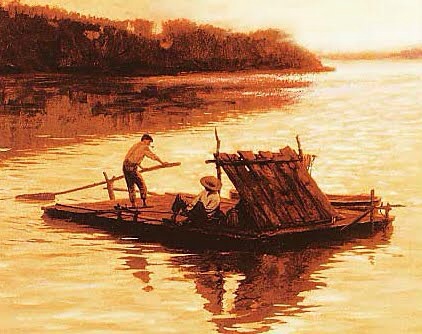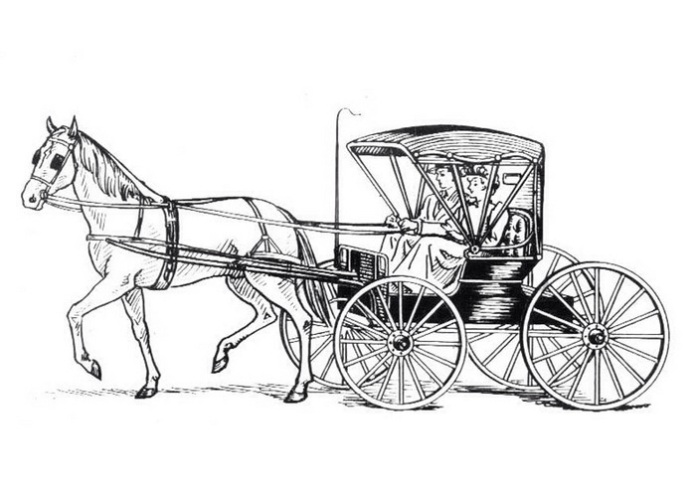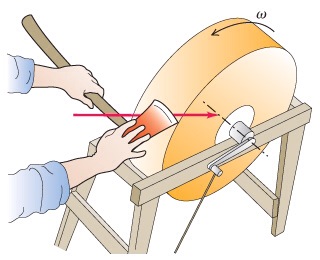In Huck Finn, there are many similarities to “Walden” in walden, Threou says to live simply, alway from society, to live in the wild. Huck does this quite literally when he floats down the river away from his town. Threou does this when he leaves town and lives in a small cabin alone in the woods. But the message of living simply. That’s also in here. They eat lots of natural foods they don’t have lots of Money, they live outdoors. Threou was almost entirely self-sufficient, he hunted and fished and gathered food, and drank natural water. Huck and Jim do,the same, they fish for food, they drink river water. Threou lived in a little shack, and they in a wigwam on their raft. They have LITTLE material possessions., as does Threou. In walden, Threou does agree with the ideas of Huck Finn, as Twain agrees with Threou
The ministers black veil and the black cat
In the story of the “Minister’s Black Veil,” the minister, Mr. Hooper, wears a black veil that symbolizes the sins people hide from God, but also form one another. When we read this piece, the message was to tell others about your fears, experiences and failures, while getting ready for this post, I read another one “Tales from the diner” (http://lustyglutton.wordpress.com/2014/10/27/tales-from-the-diner/) where a waitress shares her story about how she was mistreated and her superiors didn’t do anything about it. This relates directly to the message in the Minister’s Black Veil. She shared her failures, and then she helped others who had the same problem. In “The Black Cat” ‘ it talks about how alcoholism wrecked a man’s life. He was a great guy, nice, sweet. Think he starts to drink excessively and loses everything. If everyone who was at risk read this, I think that they would see what they are risking and would make the right choice.
Emily Dickinson and Walt Whitman and their ideas today.
Emily Dickinson was a great poet; she thought about ideas no one really touched, and if you don’t read carefully, you’ll miss it. One main occurrence in her writing is death. In her poem, “because I could not stop for death” she gets to the idea that death is eternal. She is riding a carriage with death and she says, “I first surmised the Horses Heads Were toward Eternity.” She looks at death in a new way, and it would be great if we all see death as inevitable, and not to be feared.
Walden and its implications
In English this week, we read Walden, by Threou. It was about how a man who strives to be closer to nature is daydreaming about buying the farms he sees around him. He gets close and almost buys one in real life, but the farmer’s wife can’t part with it. He says that he can do without the farm and the money because he has all he needs, seeds, 10 cents and materials for a wheelbarrow. He shows that all you need is the necessities to be happy. This is especially important in today’s world, where materialistic possessions can be very important. He reminds us here that it doesn’t matter what you wore, what you drove or what money you made, it’s what you did and will do.
Franklin, a good man? Or great?
This week we are reading about Benjamin Franklin. He was a great guy, he started the first fire department in Philadelphia, their first college (Harvard) AND the first police department! The world would be a very different place. Could you imagine what it would be like without police officers, without a fire department? But that not all! he was a great writer, in his autobiography, he used an anecdote, as a smith was cleaning an ax head, the man turned the grindstone by hand, after awhile he got tired and then asked to quit. The smith said, “we aren’t done yet it it still speckled.” To which the man replied, “I think I like a speckled ax best”. This shows how franklin shows how a man, who was an altogether good man, can still not complete a task, and still be a good man. His autobiography shows a lot of his wisdom, his anecdote that shows knowing when to quit, his aphorisms, like small leaks sink great ships, which shows how little things can add up,quickly for a lot of bad, like small stokes fell great oaks, which has the same meaning (for land lubbers)! And how even if you know you can’t do it, it NEVER hurts to try, who knows what’ll happen?
Sinners in the he hands of an angry god, today?
In class this week, we were reading an excerpt from the horrifying sermon, sinners in the hands of an angry god, by Jonathan Edwards. I would not like to have to sit for SIX hours and listen to a pastor preach about the horrors of hell, and then talk about the way to salvation for five minutes. I can only imagine, in today’s busy world how this sermon would go. Most sermons (in my experience) are only 45 minutes. Can you imagine the boredom of people of today’s society sitting still and listening for two hours, let alone six? I don’t think that this sermon would work today. We live in such a violent world today that the message would lose a lot of power. We hear of atrocities all over the world. If it was delivered today, the same way as it was over 2 centuries ago, it wouldn’t have the same effect. This scare tactics used in church back then simply wouldn’t work in today’s day and age. I think that this was very well written, but would not work well in today’s society.
Origin myth
This is an origin myth I created! It is about how the gran canyon was formed
by crazy dinosaurs, who didn’t listen! This is contains the characteristics of a Native American origin legend, as we learned in American literature this week.
Here is the link, enjoy.
https://drive.google.com/file/d/0ByFLBARoj8sgMHNzTjl2SjM5NDA/edit?usp=sharing
A little about me!
I am a junior at Chelsea High School. I play water polo and I swim for our high school team. I am 16 and I drive a truck wherever I go. I enjoy building models of farm equipment in scale and have a display.











